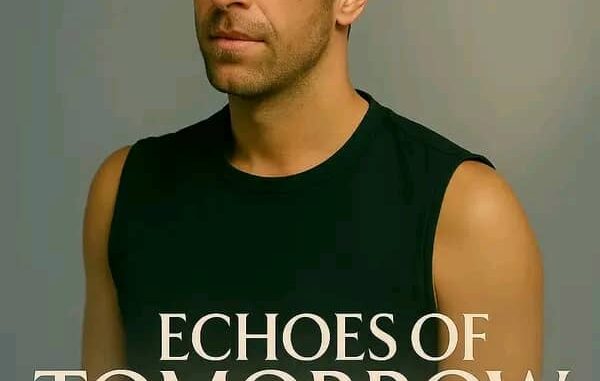
“ECHOES OF TOMORROW” — Chris Martin Releases a Powerful New 9/11 Tribute Song
On the 24th anniversary of the September 11 attacks, Chris Martin has released a deeply emotional new single titled “Echoes of Tomorrow.” With his gentle, soulful vocals and a reflective piano melody, the song unfolds like a quiet prayer — tender, aching, and filled with remembrance.
“ECHOES OF TOMORROW” — Chris Martin Releases a Powerful New 9/11 Tribute Song
On the 24th anniversary of the September 11 attacks, Chris Martin has released a deeply moving and contemplative new single titled “Echoes of Tomorrow.” It’s not a loud anthem, nor is it crafted for chart dominance. Instead, it feels like something smaller, quieter, and ultimately more meaningful — a gentle light held up in the face of one of the darkest days in modern history. With this piece, Martin once again shows his unusual ability to translate grief, hope, and memory into a language that resonates far beyond music.
The song opens with a simple piano line — sparse, reflective, almost fragile. It sounds like a memory trying to form, or a whisper carried through time. Martin’s voice enters softly, almost hesitant, with the first lyrics describing “a morning frozen in blue” and “names carried in the wind.” Rather than retelling events, he paints emotional impressions: the stillness, the shock, the impossible weight that fell upon the world that day. In many ways, “Echoes of Tomorrow” feels less like a recounting of history and more like a conversation with time itself.
What sets the song apart from many other tribute pieces is its perspective. Martin has always been drawn to themes of healing, unity, and human connection, and here he chooses to focus not on the tragedy alone but on what rose from its aftermath — kindness, resilience, silent acts of courage, and the way communities helped one another stand when standing felt impossible. The chorus, delicate but haunting, repeats the line “We carry echoes of tomorrow in the hearts we keep alive,” reminding listeners that remembrance is both an act of honoring the past and choosing hope for the future.
Musically, the production mirrors the emotional arc. The first half is intentionally restrained: piano, faint strings, and the warm presence of Martin’s voice. But as the song progresses, subtle layers begin to build — a distant hum of a choir, soft rhythmic pulses, and textures that feel like dawn breaking. It’s not the dramatic lift Coldplay fans might expect; rather, it grows almost imperceptibly, like breath returning after holding back tears. The arrangement underscores the message beautifully: healing is not explosive or sudden; it’s slow, gentle, gradual.
Lyrically, Martin avoids the clichés that often accompany tribute songs. He does not use explicit imagery of the attacks; instead, he focuses on the personal — the small, intimate details of loss and remembrance. There is a verse about “empty chairs at crowded tables,” another reflecting on “letters never sent,” and one particularly striking line about “the silence that holds every story we can’t forget.” These lines create a mosaic of grief without exploiting it. Martin’s writing feels careful, respectful, and deeply human.
What makes the track even more powerful is how intentionally it invites listeners to reflect without forcing a narrative upon them. The song creates space. For those who lived through the day, it may evoke personal memories. For younger listeners who know 9/11 only through documentaries and stories, it offers an emotional bridge — a way to understand not only what happened, but how it felt. In this way, “Echoes of Tomorrow” becomes more than a tribute; it becomes a vessel for collective memory.
Chris Martin has often spoken about his admiration for people who stand up in moments of crisis, and though he doesn’t name anyone directly in the song, the sentiment is unmistakable. The bridge — softly underscored by echoing harmonies — centers on the line “For every hand that reached through smoke, for every heart that chose to stay.” It’s a simple acknowledgment of bravery, but one that carries immense weight. With a single line, Martin honors first responders, survivors, families, and the countless ordinary people who stepped into extraordinary circumstances.
Beyond the music, the release timing is intentional. Every year, September 11 remains a moment of reflection for millions around the world. With “Echoes of Tomorrow,” Martin doesn’t attempt to redefine that moment or offer answers — instead, he joins the chorus of remembrance with humility and grace. In interviews leading up to the release, he expressed that the song was written not to reopen wounds but to “honor the way love holds on, even when time moves forward.”
The accompanying visualizer reinforces the song’s delicate tone. There are no images of the tragedy itself, no sensationalism. Instead, viewers see slow-moving shots of sky, sunrise, water, and shifting light — elements that symbolize both fragility and renewal. It’s understated, almost meditative, guiding the listener to focus on emotion rather than spectacle.
In essence, “Echoes of Tomorrow” stands as a reminder of the lasting impact of 9/11 — the loss, certainly, but also the strength and compassion that emerged in its wake. Where some tribute songs echo with intensity and defiance, Martin chooses a quieter path. His message is one of remembrance, tenderness, and forward movement. It invites listeners to hold space for grief while also recognizing the light that continues to grow around it.
Twenty-four years later, the world remains shaped by the events of that day. As generations shift and memories evolve, songs like this help keep the emotional truth alive. Chris Martin’s tribute does not claim to speak for everyone, but it speaks from a place of sincerity, offering a gentle hand on the shoulder of collective memory. “Echoes of Tomorrow” feels like a prayer, a promise, and most of all, a reminder that remembrance is an act of love — one that endures long after the echoes fade.
Leave a Reply